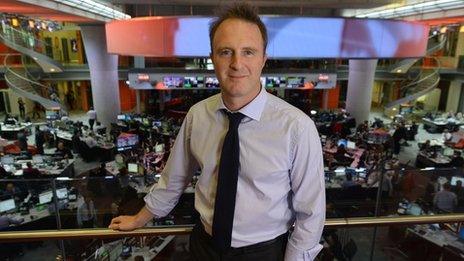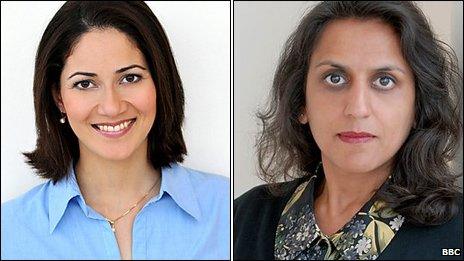BBC must tackle diversity 'problem' says news director
- Published
- comments

James Harding took up his post in August
James Harding, the BBC's news director, has said its output should "look and sound more like its audiences".
"We are going to have to be very determined to address diversity on air and, equally, off it," he told staff at New Broadcasting House in London.
The former Times editor also announced the creation of a new News Editor post to "drive the daily agenda".
He added there would be a "news impact fund" to aid the BBC's pursuit of original journalism.
"We will use the fund to free people up to devote the time and the resources to stick with a story," he said during an internal briefing on Wednesday.
The recent scandals involving Jimmy Savile and Lord McAlpine, Mr Harding continued, should not make the BBC "shy away from investigative reporting and the coverage of difficult issues".
"In fact, we must renew our commitment to curious, inquisitive journalism in the public interest."
New editors for education and health will also be appointed, with one to be based out of Birmingham or Salford.
Mr Harding said the corporation should provide more news on sports, personal finance, arts and culture, and promised to "beef up" the Ouch team, which reports on disability news.
"The BBC must strive," said Mr Harding, "to provide the best news services to disabled people across the country: to bolster disability news reporting, we will put real resources behind our Ouch team - delivering first online, but across radio and TV, too."

Mishal Husain and Ritula Shah have recently been appointed to high-profile roles on Radio 4
In addition, he pledged, there would be an increased presence for world and local news on the national news output and that the corporation would keep pace with the "galloping technology revolution".
"The consumption of news is changing before our eyes," he said. "To meet the expectations of our audiences, we need to be available everywhere, for everyone, now."
This should include "a far more open culture", where the BBC delivers "much more third party and social content alongside our own journalism".
"When we talk about 'our stories', I hope that will mean not just the work of the 8,000 people who work for the BBC," he added, "but the information and ideas of the 300 million people who use it."
'No quotas'
Mr Harding said Mishal Husain joining Radio Four's Today team and Ritula Shah's lead presenter role on The World Tonight were positive steps in terms of broadening diversity on air but that there was much more to be done.
"We've got to be clear we've got a problem," he told staff. "We've got an on-air issue. I, personally, think we've got an even bigger one off-air."
But Mr Harding said he was "extremely reluctant to impose quotas, because in the end it's not empowering to the people who get those jobs."
He said there should be "more of an effort" to get people moving within the BBC, in an effort to improve diversity, revealing that "an editor will be expected to move after six years, and definitely after eight".
However, Mr Harding insisted the BBC's News division must "continue to live within its means" and needed to find "at least a further £20 million in savings".
"The reality we face, like so many other services and businesses, is we are going to have to deliver more for less."
Wednesday's briefing marked James Harding's first statement of intent since taking up his role as director of news and current affairs in August.
He began his career at the Financial Times in 1994 before joining The Times in 2006 and becoming its editor the following year.
- Published12 August 2013
- Published16 April 2013